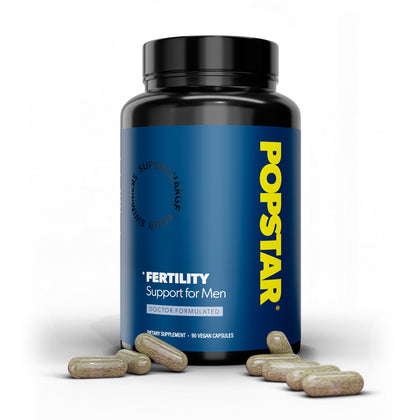

If you and your partner are actively trying to conceive, you might have come across the term "male fertility supplements." But what exactly are these supplements, and how can they support male reproductive health? In this article, we will explore the world of male fertility supplements, diving into their purpose and benefits.
Understanding Male Fertility
Before we dive into the realm of male fertility supplements, it's essential to understand male fertility and the common issues that can affect it. Male fertility refers to a man's ability to use their sperm to impregnate an egg successfully. Factors such as sperm health, count, motility (movement), and overall reproductive function play crucial roles in determining fertility.
Common issues that can impact male fertility include low sperm count, poor sperm quality, and impaired sperm motility. These issues can be caused by various factors, including hormonal imbalances, genetic disorders, lifestyle choices, and environmental factors.
Role of Nutrition in Male Fertility
Nutrition plays a vital role in male fertility, and it is often an area that can be improved to enhance reproductive health. A well-balanced diet rich in essential nutrients is crucial for optimal sperm production and function. Nutrients such as zinc, vitamin C, vitamin E, selenium, and folic acid are known to support male fertility.
However, it can be challenging to obtain all the necessary nutrients solely through diet. This is where male fertility supplements come into play, providing a convenient way to bridge the nutritional gap and ensure that the body has all the essential nutrients it needs for optimal reproductive health.
Ingredients in Male Fertility Supplements
Male fertility supplements typically contain a blend of vitamins, minerals, antioxidants, and herbs that have been scientifically studied and proven to support sperm health, motility, and overall fertility.
Zinc
Zinc is an essential mineral that plays a crucial role in sperm production and maturation. It is involved in DNA synthesis, cell division, and hormone regulation, all of which are vital for healthy sperm production.
Vitamin C
Vitamin C is a powerful antioxidant that helps protect sperm from oxidative stress and damage. It also plays a role in improving sperm motility and count.
Vitamin E
Vitamin E is another potent antioxidant that protects sperm cells from oxidative damage. It has been shown to improve sperm motility and reduce DNA damage in sperm.
Selenium
Selenium is a trace mineral that is important for sperm production and motility. It helps prevent oxidative damage and supports overall sperm health.
Folic Acid
Folic acid is a B-vitamin that is crucial for DNA synthesis and cell division. It has been shown to improve sperm count, motility, and morphology.
Research and Evidence Supporting the Use of Male Fertility Supplements
Numerous studies have investigated the effectiveness of male fertility supplements in improving sperm health and fertility. While the results vary, many studies have shown promising outcomes.
A systematic review published in the Journal of Human Reproductive Sciences analyzed several studies on the use of male fertility supplements. The review concluded that certain supplements, particularly those containing zinc, selenium, and antioxidants, can positively impact sperm quality and improve fertility outcomes.
Another study published in the Journal Fertility and Sterility found that a combination of antioxidants, including vitamins C and E, improved sperm motility and reduced DNA damage in infertile men.
It is important to note that not all male fertility supplements are created equal, and the quality of the ingredients and the formulation can vary greatly. Therefore, it is crucial to choose a reputable brand.
Choosing the Right Male Fertility Supplement
When it comes to choosing the right male fertility supplement, there are a few key factors to consider:
Quality
Look for supplements that are manufactured in a reputable facility and have undergone stringent quality control measures.
Ingredients
Check the label to ensure that the supplement contains the key ingredients known to support male fertility, such as zinc, vitamin C, vitamin E, selenium, and folic acid.
Dosage
Pay attention to the recommended dosage and follow it as instructed. Taking more than the recommended dosage does not necessarily lead to better results and may even have adverse effects.
Reputation
Research the brand and read reviews from other users to gauge its reputation and effectiveness.
Consultation
If you have any concerns or underlying health conditions, it is always advisable to consult with a healthcare professional before starting any new supplement regimen.
Dosage and Potential Side Effects of Male Fertility Supplements
Male fertility supplements typically come with recommended dosages that should be followed for optimal results. It is important not to exceed the recommended dosage, as this can lead to potential side effects.
Some potential side effects of male fertility supplements may include gastrointestinal discomfort, nausea, and allergic reactions. However, these side effects are generally rare and mild.
If you experience any adverse reactions or have concerns about the supplement's side effects, it is essential to discontinue use and consult with a healthcare professional.
Lifestyle Changes to Complement the Use of Male Fertility Supplements
While male fertility supplements can support reproductive health, they should not be seen as a standalone solution. To maximize their effectiveness, it is crucial to complement their use with positive lifestyle changes.
Healthy Diet
Incorporate a well-balanced diet rich in fruits, vegetables, whole grains, lean proteins, and healthy fats. Avoid excessive consumption of processed foods, sugary drinks, and alcohol.
Regular Exercise
Engage in regular physical activity to maintain a healthy weight and promote overall well-being. Exercise has been shown to improve sperm quality and motility.
Stress Management
Chronic stress can negatively impact fertility. Implement stress management techniques such as meditation, yoga, and relaxation exercises to reduce stress levels.
Avoid Toxins
Limit exposure to environmental toxins, such as pesticides, chemicals, and excessive heat, which can harm sperm production and function.
By incorporating these lifestyle changes alongside the use of male fertility supplements, you can create a holistic approach to optimizing male reproductive health.
Success Stories and Testimonials from Users of Male Fertility Supplements
Many men and couples have reported success in improving their fertility outcomes through the use of male fertility supplements. While individual results may vary, these success stories serve as a testament to the potential benefits of incorporating these supplements into a fertility journey.
One user shared how male fertility supplements helped increase his sperm count and motility, ultimately leading to a successful pregnancy. Another couple expressed their gratitude for the improvement in sperm quality and overall reproductive health after using male fertility supplements for several months.
While success stories are encouraging, it is important to remember that everyone's fertility journey is unique. What works for one person may not necessarily work for another. It is always advisable to consult with a healthcare professional and personalize your approach based on your specific needs and circumstances.
Final Thoughts on Male Fertility Supplements
Male fertility supplements can be a valuable tool in optimizing male reproductive health and enhancing fertility outcomes. They contain key ingredients that have been scientifically studied and shown to support sperm health, motility, and overall fertility.
However, it is important to remember that male fertility supplements are not a miracle solution. They should be used in conjunction with a healthy lifestyle, including a balanced diet, regular exercise, and proper stress management.
Before starting any new supplement regimen, it is always advisable to consult with a healthcare professional. They can provide personalized guidance based on your specific needs and circumstances.
In conclusion, male fertility supplements offer a promising avenue for men and couples who are actively trying to conceive. By incorporating these supplements into your daily routine and making positive lifestyle changes, you can potentially improve sperm count, quality, and function, ultimately increasing your chances of conception.





